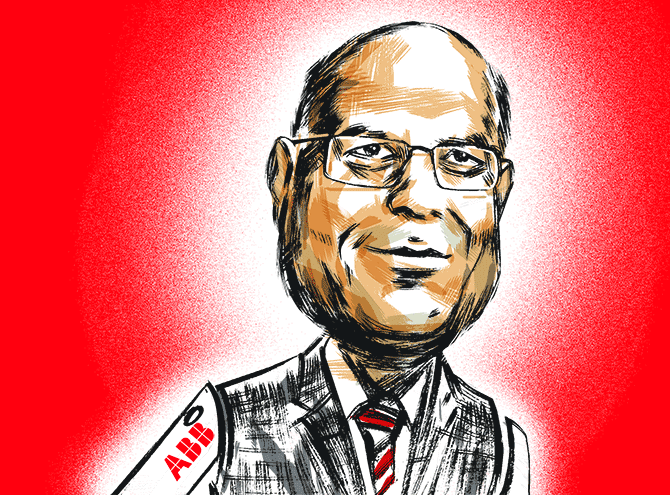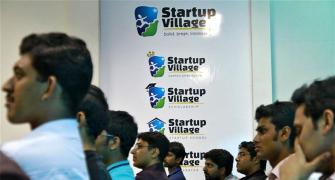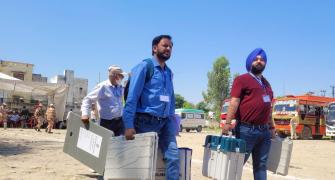'If we chose to do the right things, it is possible to avoid job losses at a mass scale,' ABB MD Sanjeev Sharma tells Raghu Krishnan.
Illustration: Dominic Xavier/Rediff.com

The ISKCON temple in north Bengaluru is an unusual place to meet our guest. In the temple, a tourist attraction in the technology hub, houses the kitchen of Akshaya Patra, the non-profit that makes nutritious meals every day to keep thousands of children in school.
The Akshaya Patra foundation runs industrial-style kitchens across India, working with several state governments in their mid-day meal programme.
It follows best practices in sourcing, in ensuring the meals are healthy and throws open its audited books so that people know how the money it collects is spent.
The north Bengaluru kitchen, the first from the foundation, produces over 200,000 meals a day, all packed in safe containers and dispatched in vans before 8:30 am to be delivered to government schools across the city.
The locally-listed arm of Swedish power and industrial automation maker ABB contributes around 16,000 meals a day, a small slice but one that helps the company meet its mandatory corporate social responsibility spending.
Its association with the non-profit has made ABB conscious that 'giving back' is not just about CSR.
Since engaging with Akshaya Patra, ABB has offered the services of doctors and ambulances deployed at its installation sites in remote locations to local communities.
We are meeting Sanjeev Sharma, managing director at ABB India, who returned to the country to take charge of operations after 17 years at ABB's various global offices.
He chooses to tour the Akshaya Patra kitchen before we sit down for lunch at a private room in Higher Taste, the vegetarian restaurant at ISKCON. The main restaurant is out of bounds -- a party is on in full swing.
A vegetarian by choice, Sharma wants to have a simple working lunch and the lady in charge suggests a platter of rotis, vegetable curry and biryani along with butter milk.
We go with her suggestion. As we wait for the food to arrive, I ask Sharma about India's job paradox: How can India create the number of jobs it needs?
Take Akshaya Patra, which is using technology to scale up, but is using less number of people than used in the mid-day meal model followed by Tamil Nadu.
If the aim is to serve nutritious and hygienic food to children, he says, the focus should be on building scale using technology and reach out to "more children, who in turn would be better citizens in future."
"Given the scale of the problem, we are addressing one per cent (of the needy children). If you use technology and increase it to 40 per cent (of the total population) you have 40 times as many jobs," says Sharma.
The need for people to cook, plan and deliver as many meals to children, for most of whom it would be the first or the only meal, would also mean up-skilling from manual labour that would only open up more employment opportunities.
"The more engaging and meaningful programmes we do in scale, jobs is not a problem in a country like us," he believes.
Sharma runs a 10,000-strong business that employs blue collar workers in factories across India making equipment, and highly qualified engineers in the R&D unit, who help design complex projects globally.
If, for instance, ABB is lying a cable under sea between Norway and Germany, all the work is done in India, except for the execution.
While there are technology shifts that impact jobs -- case in point, India's IT services firms shedding engineers as they look to reinvent -- Sharma says, India can still generate millions of new jobs if it is able to skill its people.
"One side of the story is about fear mongering about mass losses of jobs. That will happen if you don't do anything about it. I think we should fear that."
"If we chose to do the right things, it is possible to avoid job losses at a mass scale," says Sharma, speaking slowly but clearly -- a trait one probably hones working with Europeans.
The food, though without onion and garlic, seems spicy to him. We get a cup of curd to nullify the effect of the spices.
Sharma says the financial sector in India continues to be a net job generator due to scale it achieved through technology.
But when computerisation of banks started nearly two decades ago, there were protests on the streets that it would displace people.
During his stint in Malaysia, Sharma oversaw factories in 29 countries and got an overview of ABB's global business.
He restructured businesses, shut unviable factories and looked at new areas of investments.
On his return to India last year, Sharma only saw opportunity for ABB to build, grow and expand its business.
In January, ABB closed a massive contract to lay 1,800 km of high voltage power lines from Raipur, capital of Chhattisgarh, to Pugalur in Karur district of Tamil Nadu.
The two-way link will integrate thermal and wind energy for transmission of power to high consumption centres. It will help transmit thermal energy to the south during summer, when wind is low, and transmit clean energy to the north, when there is excess wind power.
Once in India, Sharma also got to travel across the country visiting factories and offices, while his wife, Mukta, stayed back in Malaysia not wanting to unsettle their second daughter who has just completed Class 12.
He catches up with reading -- he prefers writings in business and technology -- while travelling, as he waits at an airport and is on board a plane.
All that travelling across India has also given him ideas about what the country could do to generate more jobs.
India is ripe to get into manufacturing, he says, but it ought to choose the right products that can see value addition here than produce assembly line products that even a robot can do.
China is automating a lot of jobs as labour costs rise, but there are still products that need skilled human intervention.
"If you are making switches, one way would be to automate all the lines like in Germany. In India also it is possible to do those switches and in the sub-assemblies in semi-urban areas, you can create jobs."
"After the sub-assembly stage those can be integrated into a product line run by automated machines," says Sharma, as he finishes the biryani with soya nuggets. The server suggests rasmalai for dessert; we oblige.
One way to tap the opportunity India presents, he continues, is to skill people, set up assembly line finishing schools, a model Indian IT services firms perfected by getting engineering graduates to relearn in six weeks and generate thousands of jobs every year. Or scale like Akshaya Patra.
Sharma, as part of the Karnataka unit of the Confederation of Indian Industry, is ready to pilot those finishing schools that would train ITI diploma holders to be job ready in the shortest possible time.
"If you do that, these people can, as a first step, get into the low value-add and the slightly medium value-add jobs that would be shed by economies like China. This is where you can generate mass employment," he says.
Sharma also feels that the growing restrictions on travel to countries like the US would help India's software industry more than it would actually hurt.
"Instead of exporting people, we should export innovative ideas."
"As a country, you should focus on more value added skills, sell products that the world demands."
"Ensure that you have scale, have digitally trained manpower, reskill through machine learning and artificial intelligence, but get more people to take up education first," says Sharma.
"When you turn inwards, instead of trading people across the border you would focus on innovation. The world will change for the better."









